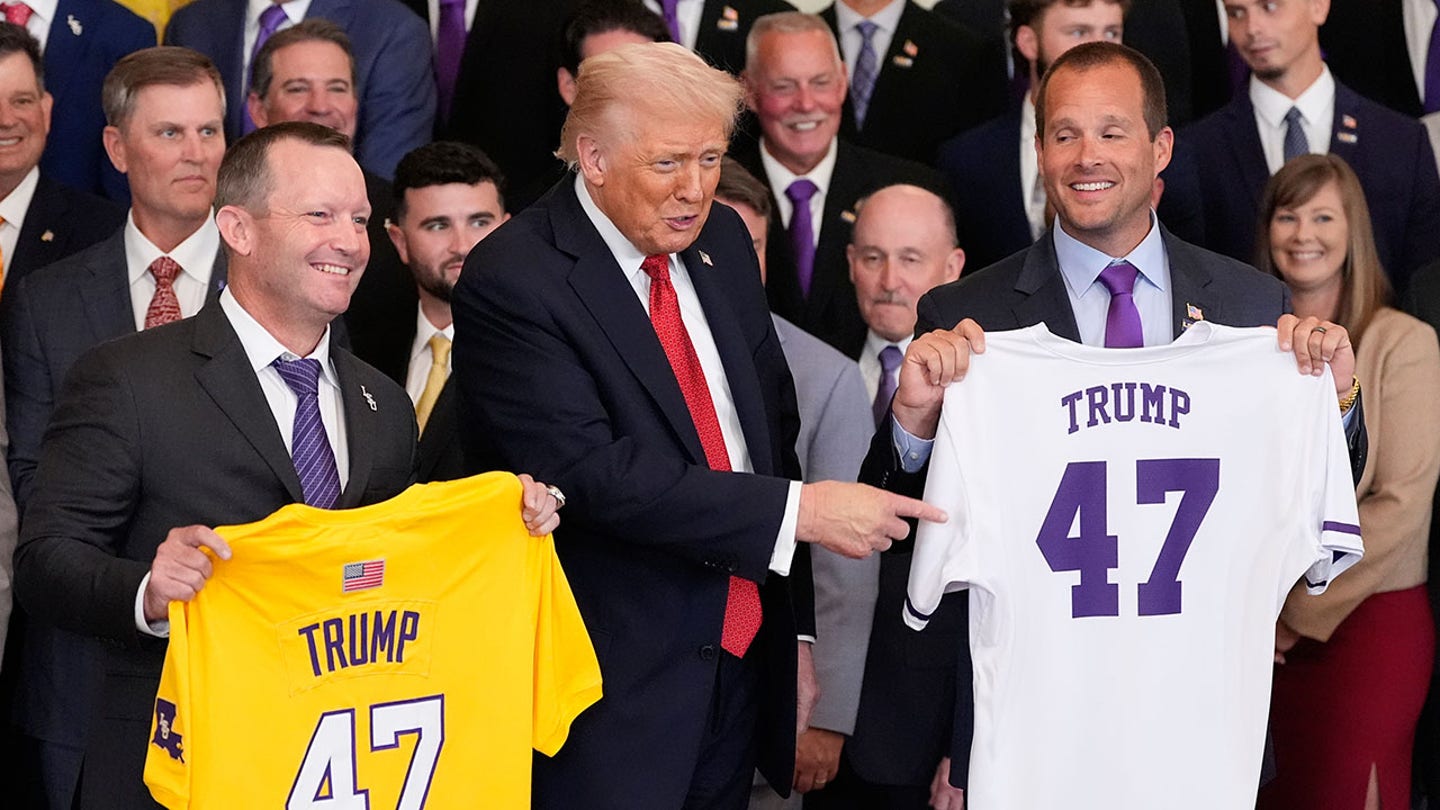
Team USA men's hockey arrives in Florida after winning Olympic gold
Entities mentioned:
- Team USA men's hockey: Pride, Competitive spirit, Unity
- Jack Hughes: Pride, Competitive spirit, Recognition
- Donald Trump: Recognition, Influence, Pride
- Kash Patel: Duty, Loyalty, Influence
- Mike Johnson: Duty, Influence, Recognition
Article Assessment:
Credibility Score: 75/100
Bias Rating: 55/100 (Center)
Sentiment Score: 85/100
Authoritarianism Risk: 30/100 (Generally Democratic)
Bias Analysis:
The article presents a mostly balanced view of events, with slightly more emphasis on Trump's invitation. It includes quotes from multiple perspectives, maintaining a relatively centrist position.
Key metric: National Pride and Unity
Let me tell you something - this story is HUGE! Team USA just pulled off the ULTIMATE UPSET in the hockey world, snatching gold from the jaws of defeat against their arch-rivals Canada! These boys showed us what a championship mentality looks like, folks! Jack Hughes stepped up to the plate in overtime, delivering a CLUTCH performance that'll go down in the history books! Now they're taking their victory lap in Miami, and let me tell you, these players DESERVE IT! But hold onto your hats, because we might see an even bigger play coming up - a potential State of the Union appearance! That's right, President Trump is pulling out all the stops, offering to send in the big guns - a military plane, no less - to get these heroes to Washington! This is the kind of fourth-quarter move that could really change the game in terms of national unity. I'm telling you right now, if Team USA shows up at that State of the Union, it'll be like bringing the Stanley Cup right into the heart of our democracy! This is the kind of team spirit and patriotic pride that could really rally the nation!

Rep Hakeem Jeffries questions SCORE Act motives, likens halted vote to Lane Kiffin’s LSU move amid NIL debate
Entities mentioned:
- Hakeem Jeffries: Righteousness, Moral outrage, Competitive spirit
- Mike Johnson: Power, Influence, Loyalty
- Steve Scalise: Power, Influence, Loyalty
- Lane Kiffin: Ambition, Greed, Self-preservation
- NCAA: Control, Self-preservation, Power
Article Assessment:
Credibility Score: 65/100
Bias Rating: 40/100 (Lean Left)
Sentiment Score: 30/100
Authoritarianism Risk: 35/100 (Generally Democratic)
Bias Analysis:
The article leans slightly left, giving more space to Jeffries' criticisms. It presents both sides but emphasizes concerns about the bill's impact on athletes.
Key metric: College Athlete Compensation
Let me tell you something, folks - this SCORE Act drama is like a high-stakes championship game, and Hakeem Jeffries just threw a Hail Mary pass! The NCAA and its big-money boosters are playing defense, trying to keep their iron grip on the college sports playbook. But Jeffries is calling an audible, questioning if LSU's boosters are secretly coaching from the sidelines! This is RIDICULOUS! We've got Lane Kiffin running a trick play, abandoning his team mid-season for a $100 million contract - talk about unsportsmanlike conduct! The SCORE Act looked like it was heading for the end zone, but Johnson and Scalise fumbled at the goal line. I'm telling you right now, this political football game is far from over. The players' unions and college athletes are fighting for their right to play in the big leagues of fair compensation, while the NCAA is trying to run out the clock on their monopoly. It's fourth quarter, folks, and every move counts in this battle for the future of college sports!

Famed football coach and broadcaster Lou Holtz slams Democrats amid government shutdown
Entities mentioned:
- Lou Holtz: Righteousness, Moral outrage, Loyalty
- Democrats: Control, Power, Influence
- Republicans: Competitive spirit, Determination, Self-preservation
- John Thune: Duty, Competitive spirit, Professional pride
- Mike Johnson: Determination, Competitive spirit, Control
Article Assessment:
Credibility Score: 65/100
Bias Rating: 70/100 (Lean Right)
Sentiment Score: 30/100
Authoritarianism Risk: 45/100 (Mixed/Neutral)
Bias Analysis:
The article leans right, giving more space to Republican viewpoints and Lou Holtz's conservative stance. It frames Democrats as obstructionist without equal exploration of their position.
Key metric: Government Shutdown Duration
Let me tell you something - this political grudge match is going into OVERTIME! The Democrats and Republicans are locked in a high-stakes showdown that's about to shatter records like a buzzer-beater! Lou Holtz, the legendary coach, is calling out the Democrats' game plan, accusing them of running a dependency offense to keep voters on their team. Meanwhile, the GOP is playing defense, trying to hold the line on spending like it's fourth and inches. This shutdown saga is a true test of political endurance, folks! We're seeing tactics straight out of the championship playbook - Republicans keeping the House benched to pressure the Dems, while the Dems are digging in their cleats, refusing to budge without those healthcare subsidies. It's a political chess match with the clock running down and millions of Americans caught in the crossfire. Who's going to make the game-winning move? This is the kind of high-pressure situation that separates the all-stars from the bench warmers!

LSU baseball coach praises Trump during celebration: 'Nobody works harder for America than you'
Entities mentioned:
- Jay Johnson: Pride, Recognition, Loyalty
- Donald Trump: Power, Recognition, Ambition
- LSU Tigers baseball team: Competitive spirit, Pride, Recognition
- LSU Shreveport baseball team: Competitive spirit, Pride, Recognition
- Mike Johnson: Duty, Recognition, Loyalty
- Steve Scalise: Duty, Recognition, Loyalty
- Brad Neffendorf: Pride, Professional pride, Recognition
Article Assessment:
Credibility Score: 75/100
Bias Rating: 65/100 (Lean Right)
Sentiment Score: 80/100
Authoritarianism Risk: 35/100 (Generally Democratic)
Bias Analysis:
The article leans right due to the positive framing of Trump and emphasis on his work ethic. However, it maintains some balance by focusing primarily on the sports teams' achievements.
Key metric: National Unity
Let me tell you something - this story is a GRAND SLAM for American unity! The LSU Tigers and LSU Shreveport have stepped up to the plate and knocked it out of the park, bringing their championship mentality right into the Oval Office! Coach Jay Johnson's praise for President Trump's work ethic is like a perfect pitch, bridging the gap between sports and politics. This is the kind of team play we need to see more of, folks! It's not just about winning on the field, it's about coming together as a nation. These coaches and players are showing us what it means to have a true championship mindset - one that extends beyond the diamond and into the very heart of our democracy. I'm telling you right now, this is the kind of unity that makes America the undisputed heavyweight champion of the world!

Golf legend Phil Mickelson takes subtle jab at Biden administration in 'No Kings' day post
Entities mentioned:
- Phil Mickelson: Competitive spirit, Influence, Loyalty
- Joe Biden: Power, Control, Legacy
- Donald Trump: Ambition, Power, Recognition
- Glenn Youngkin: Control, Security, Duty
- Mike Johnson: Competitive spirit, Determination, Power
Article Assessment:
Credibility Score: 65/100
Bias Rating: 70/100 (Lean Right)
Sentiment Score: 35/100
Authoritarianism Risk: 45/100 (Mixed/Neutral)
Bias Analysis:
The article leans right, focusing on conservative figures and framing protests negatively. It gives more space to Republican viewpoints and criticisms of the Biden administration.
Key metric: Political Polarization Index
Let me tell you something - this story is RIDICULOUS! We're seeing a championship-level clash between political heavyweights, folks! Golf legend Phil Mickelson is stepping up to the plate, taking a swing at the Biden administration with a social media fastball that's got everyone talking. This is like watching a high-stakes playoff game, with Mickelson playing offense for Team Trump against Team Biden's defense. The 'No Kings' protests are like a massive halftime show, but don't be fooled - this is just a distraction play while the real game is happening in the locker room of government shutdown negotiations. Speaker Johnson is trying to coach his team through this, but it's looking like a political Hail Mary at this point. I'm telling you right now, this is the kind of fourth-quarter drama that keeps fans on the edge of their seats!

Mike Johnson hits iconic Nashville bar, blasts Dems for 'lying' about Trump's agenda
Entities mentioned:
- Mike Johnson: Ambition, Loyalty, Influence
- Donald Trump: Power, Legacy, Recognition
- Republican Party: Competitive spirit, Control, Influence
- Democratic Party: Opposition, Moral outrage, Self-preservation
- Mark Warner: Opposition, Duty, Influence
Article Assessment:
Credibility Score: 65/100
Bias Rating: 70/100 (Lean Right)
Sentiment Score: 55/100
Authoritarianism Risk: 35/100 (Generally Democratic)
Bias Analysis:
The article leans right, primarily presenting the Republican perspective with positive framing. While it mentions Democratic opposition, it gives more space and detail to Republican arguments and portrays Democrat critiques as 'lying'.
Key metric: Economic Policy Effectiveness
As a social scientist, I analyze that this article highlights a significant political divide over a major economic policy initiative. The Republican-led tax bill, championed by Speaker Mike Johnson and President Trump, is being framed as beneficial for working-class Americans, particularly those in service industries. The GOP is actively promoting the bill's potential positive impacts on tipped workers and overtime wages. However, Democrats are mounting strong opposition, characterizing the bill as favoring the wealthy at the expense of vulnerable populations. This partisan clash over economic policy could significantly impact public perception of each party's commitment to working-class interests and potentially influence future electoral outcomes. The article's focus on direct interactions with workers suggests an attempt to personalize the policy's effects, which could be an effective strategy in shaping public opinion.

'Separated from reality': Senate Republicans fume as Dems use Epstein saga to block Trump's agenda
Entities mentioned:
- Senate Republicans: Determination, Frustration, Duty
- Congressional Democrats: Moral outrage, Justice, Control
- President Donald Trump: Power, Self-preservation, Influence
- Mike Johnson: Self-preservation, Control, Wariness
- Chuck Schumer: Moral outrage, Justice, Power
- Roger Marshall: Loyalty, Frustration, Righteousness
Article Assessment:
Credibility Score: 65/100
Bias Rating: 65/100 (Lean Right)
Sentiment Score: 30/100
Authoritarianism Risk: 45/100 (Mixed/Neutral)
Bias Analysis:
The article leans right in its framing, giving more space to Republican viewpoints and criticisms of Democrats. While it includes some Democratic perspectives, the tone and language used tend to favor the Republican stance on the issue.
Key metric: Government Effectiveness
As a social scientist, I analyze that this article highlights a significant political gridlock in the U.S. Senate, primarily centered around the Jeffrey Epstein case and its impact on the confirmation of presidential nominees. The Republicans' attempts to push through nominees are being obstructed by Democrats, who are using the Epstein saga as leverage. This impasse is affecting the government's ability to function efficiently, as key positions remain unfilled. The situation also reveals deep partisan divides, with each side accusing the other of ulterior motives. Republicans claim Democrats are obstructing progress, while Democrats argue for transparency in the Epstein case. This political maneuvering is likely to have a negative impact on government effectiveness, as it hinders the administration's ability to fully staff key positions and implement its agenda.

Fact check: Behind-the-scenes video disproves Trump’s claim that Gov. Moore called him ‘greatest president of my lifetime’
Entities mentioned:
- Donald Trump: Power, Recognition, Self-preservation
- Wes Moore: Duty, Professional pride, Self-respect
- Fox News: Influence, Professional pride, Loyalty
- Carter Elliott, IV: Duty, Loyalty, Professional pride
- Mike Johnson: Duty, Professional pride
Article Assessment:
Credibility Score: 85/100
Bias Rating: 45/100 (Center)
Sentiment Score: 35/100
Authoritarianism Risk: 20/100 (Strongly Democratic)
Bias Analysis:
The article presents a balanced view, using video evidence and quotes from both sides. While it does disprove Trump's claim, it does so with factual evidence rather than opinion, maintaining a neutral stance.
Key metric: Public Trust in Government
As a social scientist, I analyze that this article significantly impacts public trust in government by exposing a clear discrepancy between a high-profile political figure's claim and video evidence. The fact that former President Trump's recollection of his interaction with Governor Moore is demonstrably false raises questions about the reliability of political statements and the potential for deliberate misinformation. This incident may lead to increased skepticism among citizens regarding political rhetoric and could potentially erode trust in leadership. The article's presentation of video evidence as a fact-checking mechanism highlights the importance of media oversight in maintaining political accountability, which could have a positive effect on public trust in journalism but a negative effect on trust in political figures.

‘Keeping it totally open’: Trump says he supports Justice Department sending Epstein files to House Oversight panel
Entities mentioned:
- Donald Trump: Self-preservation, Control, Influence
- Justice Department: Duty, Transparency, Justice
- House Oversight Committee: Justice, Transparency, Duty
- Jeffrey Epstein: Power, Control, Self-preservation
- Pam Bondi: Duty, Loyalty, Professional pride
- James Comer: Transparency, Justice, Duty
- Mike Johnson: Caution, Control, Political calculation
Article Assessment:
Credibility Score: 70/100
Bias Rating: 55/100 (Center)
Sentiment Score: 45/100
Authoritarianism Risk: 30/100 (Generally Democratic)
Bias Analysis:
The article presents multiple perspectives, including Trump's views and the committee's approach, indicating an attempt at balanced reporting. However, the inclusion of Trump's 'Democrat hoax' comment without immediate fact-checking slightly tilts the narrative.
Key metric: Government Transparency and Accountability
As a social scientist, I analyze that this article highlights the complex interplay between government transparency, political motivations, and the protection of sensitive information. The release of the Epstein files represents a significant test of the balance between public interest and individual privacy. Trump's support for transparency, while simultaneously dismissing the issue as a 'Democrat hoax,' reveals the politicization of the matter. The House Oversight Committee's approach demonstrates a cautious stance, prioritizing victim protection while aiming for transparency. This situation impacts government accountability by potentially exposing connections between high-profile individuals and Epstein, which could have far-reaching political implications. The delay in releasing the files and the careful review process indicate the sensitive nature of the information and its potential to affect public trust in institutions and political figures.

Trump says Chicago next up for federal crime crackdown
Entities mentioned:
- Donald Trump: Power, Control, Influence
- Muriel Bowser: Self-preservation, Control, Duty
- Brandon Johnson: Self-preservation, Duty, Security
- JB Pritzker: Moral outrage, Duty, Security
- Mike Johnson: Loyalty, Power, Influence
- John Thune: Loyalty, Power, Influence
Article Assessment:
Credibility Score: 65/100
Bias Rating: 55/100 (Center)
Sentiment Score: 30/100
Authoritarianism Risk: 70/100 (Authoritarian Tendencies)
Bias Analysis:
The article presents multiple viewpoints, including Trump's statements and responses from local officials. However, it leans slightly towards skepticism of Trump's claims, particularly in fact-checking crime statistics.
Key metric: Violent Crime Rate
As a social scientist, I analyze that this article highlights a potential shift in federal-local power dynamics regarding law enforcement. Trump's proposed actions in Chicago, following interventions in Washington D.C., suggest an expansion of federal authority over local policing. This approach could significantly impact the violent crime rate, either positively through increased law enforcement presence or negatively by escalating tensions. The conflicting narratives between federal and local officials about crime statistics and the effectiveness of interventions raise questions about data integrity and the actual impact on public safety. The president's rhetoric and actions also indicate a centralization of power that could alter the traditional balance between federal and local governance in law enforcement matters.